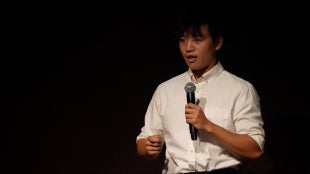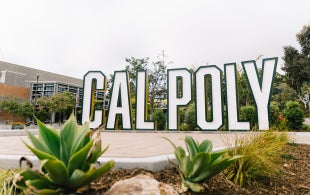Cal Poly Named a Top Producer of 2022-23 U.S. Fulbright Scholars
Contact: Keegan Koberl
805-458-9302; kkoberl@calpoly.edu
Faculty Awardees are Teaching and Researching in Poland and South Africa
SAN LUIS OBISPO — Cal Poly has again been named a top producer of U.S. Fulbright scholars by the U.S. Department of State’s Bureau of Educational and Cultural Affairs. The distinction was in the Master’s Colleges and Universities category for the 2022-23 academic year.
Three Cal Poly faculty were awarded grants for the 2022-23 academic year: Greg Domber, lecturer in the History Department, and Mira Rosenthal, associate professor of English, are teaching and conducting research at the Jagiellonian University in Krakow, Poland. Nishanta ‘Nishi’ Rajakaruna, professor of biology, is teaching and conducting research at North-West University in Potchefstroom, South Africa.
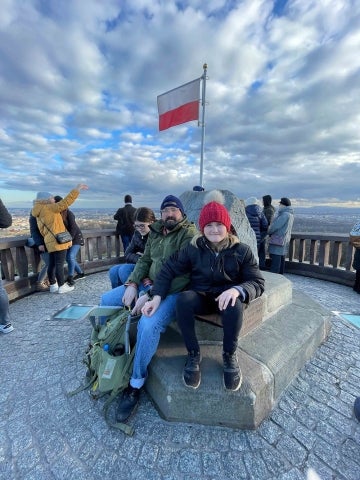
Domber and Rosenthal are a married couple who met in Poland while pursuing Student Fulbright Scholarships as graduate students. Domber’s research focus is a digital history project to better understand the influences of American exchange programs on Poland’s negotiated transformation away from communism in 1989.
“For much of my first months in Poland, I have been focused on building out a relational dataset on the 570 Poles who participated in their country’s roundtable negotiations in February 1989 -- talks which set the ground rules for semi-free elections in June 1989 and basically gave meaningful political and economic power to Poland’s anti-communist opposition,” Domber said. “Much of my time has been spent tracking down information on the roundtable participants in the Jagiellonian University library and in government archives in Warsaw. As part of this project, I’ve also been building out a dataset with information on Poles who participated in East-West exchanges, funded by Americans.”
Rosenthal has focused on translating a selection of poetry by Zuzanna Ginczanka, an interwar Polish poet of Jewish heritage who was murdered at the end of World War II. Her work fell into obscurity until the last 10 years. Since then, there’s been a concerted effort to rediscover her poetry and establish her legacy.
“I’ve benefited immensely from being able to consult with Ginczanka scholars in my department at Jagiellonian University and utilize the research collections at the library here,” Rosenthal said. “During the spring, as I continue my translation work during the second half of my time here, I’ll be teaching a course on contemporary American documentary poetry, with the aim of having my students work on translations of it into Polish. I’ll also be giving a public lecture for the Jewish Studies Department at Wrocław University and working in Ginczanka’s archive in Warsaw.”
The couple has seen some of the effects of the Russian invasion of Ukraine, most notably the Poles’ support of their neighbors. Domber and Rosenthal began volunteering at the Jewish Community Center of Krakow, a group that houses about 350 Ukrainian families and provides access to a food bank.
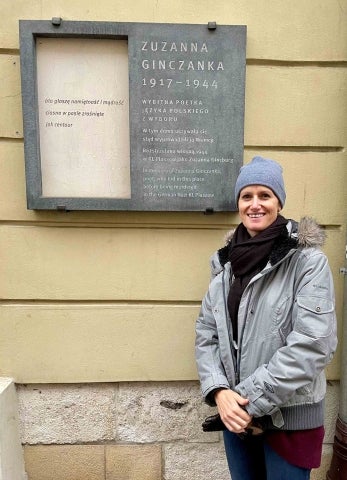
“Almost all our friends here have stories of opening up their homes to the women and children who streamed across the border in those first six months after Russia attacked,” Domber said. “They provided a warm room, food and comfort -- sometimes for months on end and often for multiple families over a series of months. Students at Jagiellonian University have talked about how they raised money to buy book bags and supplies so that Ukrainian kids would have what they needed to go to school in Poland.”
In South Africa, Rajakaruna embarked on five-week field expedition studying gypsum ecosystems, gave multiple keynote addresses at regional conferences in his field and was awarded for his Exceptional Contribution to Research Excellence from the Unit for Environmental Sciences and Management at North-West University.
“The plants, lichens, wildlife and landscapes I have encountered have not only given me a solid introduction to the fascinating natural history of southern Africa but also to the many peoples who call this land their home,” Rajakaruna said.
In November, Rajakaruna was visited by his research mentee, biological sciences student TJ Samojedny, who came to South Africa to talk about his senior project research with students and faculty. Samojedny presented on how to repurpose an X-ray device typically used in other geological settings to scan plant specimens.
“I am also thrilled that I have now developed two new hobbies — birding and wildlife photography,” Rajakaruna said. “To date, I have seen 239 species of southern African birds and photographed many of them alongside many other animals I have encountered in my travels.”
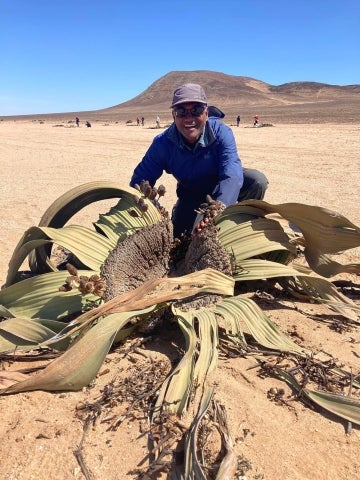
Nishanta ‘Nishi’ Rajakaruna with Welwitschia mirabilis subspecies namibiana in the Namib Desert.
Rajakaruna’s photography won an award at North-West University's ENVIRA Photography Competition in December.
Fulbright is the U.S. government’s flagship international educational exchange program. It is also among the largest and most diverse exchange programs in the world. Since its inception in 1946, more than 400,000 participants from all backgrounds and fields — including recent university graduates, teachers, scientists, researchers, artists and others, from the U.S. and over 160 other countries — have participated in the Fulbright Program. Fulbright alumni have returned to their home countries to make an impact on their communities, thanks to their expanded worldview, a deep appreciation for their host country and its people, and a larger network of colleagues and friends. For more information about the Fulbright Program, visit fulbrightprogram.org.

